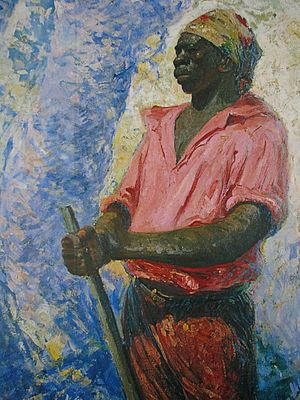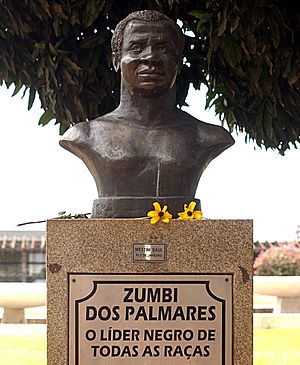Zumbi facts for kids
Quick facts for kids Zumbi dos Palmares |
|
|---|---|

Zumbi (1927) by Antônio Parreiras
|
|
| King of Quilombo dos Palmares | |
| Reign | 1680–1695 |
| Predecessor | Ganga Zumba |
| Successor | Camuanga (de jure) of the resistance, kingdom destroyed. |
| Born | Francisco Nzumbi 1655 Serra da Barriga, Captaincy of Pernambuco, Portuguese America (present-day União dos Palmares, Alagoas, Brazil) |
| Died | 20 November 1695 (aged 39–40) Serra Dois Irmãos, Captaincy of Pernambuco, Portuguese America (present-day Viçosa, Alagoas, Brazil) |
| Spouse | Dandara |
| Religion | Islam |
Zumbi (1655 – November 20, 1695), also known as Zumbi dos Palmares, was a brave leader in Brazil. He was one of the first people to fight against the slavery of Africans by the Portuguese in colonial Brazil.
Zumbi was also the last king of the Quilombo dos Palmares. This was a special settlement of Afro-Brazilian people who had freed themselves from slavery. It was located in what is now the state of Alagoas, Brazil. Zumbi is seen as a symbol of African freedom in Afro-Brazilian culture.
Contents
What were Quilombos?
Quilombos were communities in Brazil. They were started by people of African descent who had escaped slavery. These escaped slaves are often called maroons.
People from quilombos sometimes went back to plantations or towns. They encouraged other enslaved Africans to escape and join their communities. If needed, they helped others flee and sometimes damaged plantations.
Anyone who came to a quilombo on their own was considered free. Some women also chose to flee to Palmares. They wanted to escape difficult situations. Men were also asked to join Palmares. Even Portuguese soldiers who didn't want to fight sometimes joined.
Palmares started around 1605. About 40 enslaved Central Africans escaped to the thick forests in Brazil. The Portuguese called this area Palmares because of its many palm trees. They fought many battles with Palmares for most of the 1600s.
Quilombo dos Palmares was like its own kingdom. It was made up of Maroons who had escaped from Portuguese settlements. It was a very large area, possibly the size of Portugal. At its biggest, Palmares had over 30,000 people.
Palmares grew into a group of 11 towns. These towns were spread across rough, mountainous land. This land is now in the states of Alagoas and Pernambuco. Palmares was an independent state. It followed African political and religious customs. The people supported themselves by farming, fishing, hunting, and trading. They also sometimes raided nearby plantations.
Zumbi's Family History
Zumbi's mother, Sabina, was the sister of Ganga Zumba. Ganga Zumba was believed to be the son of Princess Aqualtune. She was the daughter of a king from the Kingdom of Kongo. It is not known if Zumbi's mother was also a daughter of the princess. But this still means Zumbi was related to the Kongo royal family.
Zumbi and his family were from Central Africa. They were brought to the Americas after a big fight called the Battle of mbwila. The Portuguese won this battle. They captured many people, including the king and many nobles. These captured people were then sold as slaves in the Americas.
It is very likely that Ganga Zumba and Sabina were among these nobles. They became slaves on a plantation in Brazil. From there, they managed to escape to Palmares.
Zumbi's Early Life
Zumbi was born free in Palmares in 1655. His family was believed to be from the Congo region. When he was about six years old, Zumbi was captured by the Portuguese. He was given to a missionary, Father António Melo.
Father António Melo baptized Zumbi and named him Francisco. Zumbi learned Portuguese and Latin. He later used his knowledge to help build the Kongo kingdom in Palmares.
In 1670, Zumbi escaped from the missionary. He was 15 years old and returned to Palmares, where he was born. Zumbi quickly became known for his strength and cleverness in battle. By his early twenties, he was a respected military leader.
Becoming King of Palmares
By 1678, the governor of Pernambuco, Pedro Almeida, was tired of fighting Palmares. He offered a peace deal to Ganga Zumba, the king of Palmares. Almeida offered freedom to all runaway slaves if Palmares would accept Portuguese rule. Ganga Zumba liked this idea.
But Zumbi did not trust the Portuguese. He had become the main military leader of Palmares in 1675. He refused to accept freedom for Palmares while other Africans were still enslaved. Zumbi rejected Almeida's offer. He also challenged Ganga Zumba's leadership. In 1678, Zumbi killed his uncle Ganga Zumba. Zumbi wanted to fight the Portuguese more aggressively.
Zumbi promised to keep fighting for Palmares' independence. He became the new king of Palmares. His strong will and brave efforts made him very respected. As Zumbi took charge, tensions with the Portuguese quickly grew. Between 1680 and 1686, the Portuguese launched six attacks on Palmares. These attacks cost a lot of money, but they all failed to defeat Palmares.
In 1694, the Portuguese colonists launched a major attack on Palmares. This was 15 years after Zumbi became king. The attack was led by military commanders Domingos Jorge Velho and Bernardo Vieira de Melo. They used powerful cannons and a strong force of Brazilian Indian fighters. It took 42 days to defeat the kingdom.
On February 6, 1694, the Portuguese destroyed Cerca do Macaco. This was the main settlement of Palmares. Some people kept fighting, but on November 20, 1695, Zumbi was killed. His head was put on a pole to show that he was not immortal.
Even though Palmares was eventually defeated, its success for most of the 1600s was very important. It showed that enslaved people could resist colonial power. Palmares became a symbol of slave resistance for the future.
Zumbi in Afro-Brazilian Stories
Slaves at the time believed Zumbi was like a demigod. People across the country thought his strength and courage came from African spirits called Orixas. They believed he was half-man, half-god. Others thought he was the son of Ogum, a powerful Orixa.
Why Zumbi is Important Today
November 20 is celebrated in Brazil as Black Awareness Day. This day is very special for Brazilians of African descent. They honor Zumbi as a hero, a freedom fighter, and a symbol of freedom.
Zumbi has become a hero of the Afro-Brazilian political movement in the 20th century. He is also a national hero in Brazil. Today, Zumbi is seen as a great hero among Afro-Brazilians. They celebrate his courage, his leadership, and his brave fight against Portuguese rule.
Tributes to Zumbi
- The airport serving Maceió, Brazil, is named Zumbi dos Palmares International Airport.
- He is the subject of the 1974 Jorge Ben song "Zumbi".
- He is mentioned in the 1978 Caetano Veloso song "Sampa".
- Gilberto Gil released a CD called Z300 Anos de Zumbi.
- The 1985 film Quilombo by Carlos Diegues is about Palmares.
- The band name Chico Science & Nação Zumbi (later just Nação Zumbi) includes his name.
- The band Soulfly has a song titled "quilombo," and Zumbi is mentioned in some of their lyrics.
- He is mentioned in the Sepultura song "Ratamahatta."
- His name is given to a fighter in the Capoeira Fighter 2 & 3 games.
- On March 21, 1997, his name and story were added to the Book of Steel. This book is in the Tancredo Neves Pantheon of the Fatherland and Freedom. It is a monument that honors Brazil's national heroes.
- Arena Conta Zumbí is a 1964 play about Zumbi. It was written by Gianfrancesco Guarnieri and Augusto Boal, with music by Edu Lobo.
See also
 In Spanish: Zumbi dos Palmares para niños
In Spanish: Zumbi dos Palmares para niños
- Atlantic slave trade
- Cafuzo
- Capoeira
- Garifuna people
- Palmares (quilombo)
- Quilombo
- Slavery
- Triangular trade
- Zambo
- List of slaves
 | Jessica Watkins |
 | Robert Henry Lawrence Jr. |
 | Mae Jemison |
 | Sian Proctor |
 | Guion Bluford |




